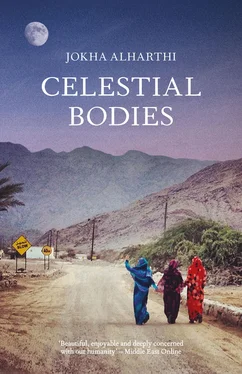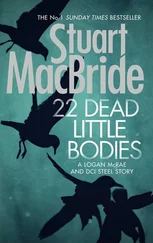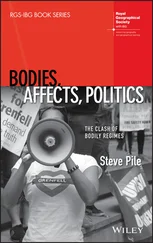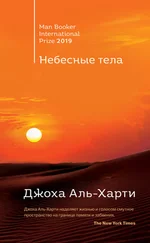I did not listen to my cousin. I did not buy a building. I bought shares and then the stock market crashed. There was a lot of funny business that went on but the newspapers were quiet about it. They didn’t even print anything about the rape of Hanan and her schoolmates in the south.
Hanan was teaching at an elementary school way in the south, in Salalah Town, near the border It was the middle of the night when London phoned us. A gang of teenaged boys had assaulted the teachers’ dormitory, she said. There had been rapes. Hanan — she was raped. And people were silent. Who bought this loud silence? London nearly went mad. She stayed in the hospital with Hanan, her good friend, who had had a nervous breakdown.
I stayed next to my father in the hospital. Over and over, I moistened his dry lips with drops of water, and closed his eyes. And then I cried. Though I didn’t shed a single tear in front of people after his funeral. In my pressed white dishdasha, wearing my dagger and the requisite coloured turban, I remained there, at home, from morning to sundown, the entire three days, shaking hands with all of the men who came to offer condolences. Over and over I murmured, Al-baqaa lillah. Our lives are in God’s hands, their lives go on in ours. The well-wishers ate meat and rice and went away. In the evenings, I closed myself into his room. Something burned inside me, though I didn’t, and don’t, know what it was. Something was consuming me. In the hospital, my father in a coma, I pushed the turban back from the top of my forehead and brought the scars of my deep wound, still so visible, as close as I could to his open eyes. Then I pushed the robe off my shoulder which still carried the harsh marks of knife blades and rough palm-fibre ropes.
Do you remember the day of the magpies? I whispered to him. He did not move. The hand that had tied me up in palm fibres and had thrust me down the well to dangle there head-first for what seemed like hours, my head and body colliding against the edges of its stone walls, did not move. I whispered again, into his ear. Sanjar is a little younger than me, yes, like you said. But Sanjar dared me to steal the rifle. I was going to put it back where it belonged. I would have put it back, but Marhun told on me.
He didn’t move. I raised my voice. Sanjar fled, you didn’t hit Marhun, and I nearly died of fear, hanging upside down in the total blackness of the well, tied up in palm fibres and no idea when I might be untied.
The hand that had done all of that no longer moved. The hand remained there, passive, fused to the feeding tubes, completely motionless. I seized it. I moved it along the bumpy traces of my wounds. I pressed it hard into my flesh and burst into hopeless, desperate tears.
Asma went into the big room that the girls shared. Remote from the rest of the house, it was like a growth that had attached itself to the far corner of the courtyard. When Mayya and her sisters had reached a certain age, their mother began to worry. She would feel easier if they could be kept apart from the main bulk of the house. She didn’t want them to run into male relatives who might come into the main reception room. After all, men from the clan could appear at any time, coming to fulfil some family obligation. She asked her husband to have this room in the courtyard built for them.
As usual, Khawla was scrunched over in front of her mirror, but she had a small and unfamiliar object in her hands. What’s that, Khawla? Asma squatted down next to her sister. Khawla whispered the answer. Lipstick!
Asma gasped, took it from her sister’s hand, and inspected it. Bright red inside, the lipstick was concealed by its awesome shell, in the shape of a golden bird. Where did you get this thing? Asma asked her sister.
Khawla snatched it away from her. I asked Mayya to buy it for me in Muscat before she went in to the hospital to have the baby. Asma stared at the fancy golden bird and muttered, But my mother...
Khawla looked her in the eye. My mother won’t know anything about it unless... Asma nodded to reassure her and moved away, turning to the shelf where the books were now lined up, after their rescue from the damp and rot in the storeroom. She pawed through them until she found the volume bound in blue and read the title out in a loud voice. Musnad al-Imam al-Rabi’ bin Habib. The Well-Supported Prophetic Traditions Compiled by the Imam al-Rabi’ bin Habib . Turning over the dog-eared, disintegrating title page, she read the uneven scrawl on the page beneath:
The owner of this book, who beseeches for God’s mercy, is Masoud bin Hamid bin Muhammad, it having come into my possession as a gift from my friend and brother, Ali bin Salim bin Muhammad. I inscribe these words on this page, with my own hand, fleetingly mortal though it may be.
Asma did not like handwriting. It always reminded her of the day the school had opened in al-Awafi, a few years back. The school had opened but girls older than ten weren’t allowed in. They would only be admitted to the basic adult literacy classes, and those didn’t even begin to happen until some time later. Asma had heard that some of the lads who showed themselves able to write out their first names were allowed right away into the third grade, whatever their real age was. She hadn’t known how that could happen, since she was not there on the first day anyway. She was already too old to try for it. Then she was entered on the books for the adult literacy classes even though she wasn’t actually old enough for those. She had barely reached middle school when they closed down the classes. They said there weren’t enough students. In her sloppy, sloping hand, the teacher wrote on the blackboard: Classes are cancelled due to lack of numbers. Asma walked out of the school. Ever since, uneven handwriting had made her sick.
Instead of preserving the beauty of your eyes you blind them through reading, Khawla remarked. Asma responded, but half under her breath. Shut up, stupid! Ever since you left school two years ago you haven’t so much as cracked a book’s cover open. Hardly even the Holy Book! If it weren’t for my mother’s whip hand in Ramadan you would never open it at all.
Khawla shrugged scornfully and turned her back, gazing again into her mirror. Asma skipped through some pages and suddenly, catching a particular passage, she smiled. She read it out loud.
Abu Hurayra, may God be pleased with him, recited: When the Messenger of God (may God’s prayers and mercy be upon him) was praying, he said to his wife, Aisha, hand me my robe. She said, But I am having my period. He said, That isn’t your fault and it doesn’t matter.
I was sure there was something, Asma bayed. I knew it! But Muezzin-Wife...
Asma began repeating the Prophet’s words to herself until she had memorised the passage. She wanted to tell her mother and Mayya every word. She giggled, imagining what a tizzy this would send Muezzin-Wife into — seeing them all eating together, in the knowledge that childbirths and periods and what have you didn’t soil anyone. She returned the book to its place amongst the others — Fruit for the Wayfarer with its ordinary paperbound cover, the Mustatraf bound in red velvet and printed at the Mahmudiyya Press in Cairo, the collection of poetry by the famous ancient Arab poet Antara in its leather binding and inside the old-fashioned lithograph type and the close handwritten commentary in the margins. There was also the book called The Stories of the Prophets , a small and worn volume printed in Calcutta, as well as a large tome, the pages yellowed, which was, the title page announced, Part Two of The Unique Necklace by the noble Imam Shihab al-Din Ahmad, Alone of his Age, the Era’s Sage, known (as it also said) as Ibn ‘Abd Rabbih, Son of the Servant of his Lord, from Andalusia, of the Malekite School of Islamic Law, God shower His beneficence on him and let him dwell in God’s broadest green paradise, Amen. In the margin (the title page went on to say) is inscribed the text Zahr al-adab wa-thamar al-albab by Abu Ishaq Ibrahim bin Ali, he who was known as al-Husari of Qayrawan, of the Malekite legal School of Islam, may God Almighty bless him.
Читать дальше












